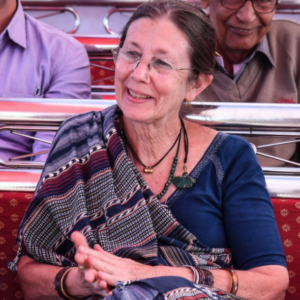The University of Wisconsin–Madison Division of the Arts (presenter) welcomes Judy Frater as the spring 2022 interdisciplinary artist-in-residence. Judy Frater is a curator, author and school director who lived in the Kutch region in Northwest India for 30 years. An award-winning Ashoka Fellow, she founded a design school for artisans currently operating as Somaiya Kala Vidya and co-founded the Kala Raksha Trust and Museum.

For the semester, Frater is teaching a 3-credit course “Cultural Diversity, Connection, Value, Sustainability – the Role of Hand Craft.” The students in the course will learn about important issues surrounding small-scale artisan production, value and sustainability. Students will develop valuable skills working with artisan partners through craft techniques, design, quality control, branding and story-telling.
They will also explore UW–Madison’s Helen Louise Allen Textile Collection and learn to use the holdings as inspiration. They will exhibit their co-designed products later in the semester in the Lynn Mecklenburg Textile Gallery. Four textile artisans, a hand weaver, hand block printer and natural dyer, a bandhani (Shibori) artist and an embroiderer will virtually co-teach the studio craft sessions and coordinate the artisans partnering with students in the co-design segment. For more details about the course and residency visit: go.wisc.edu/frater.
The first public event of the semester will be on February 17. Later this spring, the students’ exhibition “Cross Cultural Collaborations: Inspired by Tradition/Created Today” will be on view from April 20-May 27 in the Lynn Mecklenburg Textile Gallery on campus. Scheduled events include an exhibition opening (April 20), student panel (April 28) and a trunk show (April 30). More details about the exhibition and April events will be available later this spring.
Thurs., February 17 | 5:30 p.m.
Our Kind of Happy Hour – “Embroidery: A Women’s History of Kutch”
Virtual on the Chazen Museum of Art’s Facebook page
https://www.facebook.com/ChazenArtUW
Free
Spring 2022 interdisciplinary artist-in-residence Judy Frater will present “Embroidery: A Women’s History of Kutch.” Kutch, a desert region of northwestern India, was historically known for its myriad of craft traditions, notably a dazzling array of hand embroideries. Often called “mirror work,” the intricate hand stitching is in fact a range of styles comprising unique combinations of stitch, color, motif and pattern practiced by women of many different ethnic groups. By culture restricted to social discourse among their own community, with limited interactions beyond, women highly valued creative innovation. The embroideries they created narrate a rich history of different ethnic groups, their aesthetics and values and the influences of their intermingling over time. This event is hosted by the Chazen Museum of Art as part of their Our Kind of Happy Hour series.
About
Judy Frater’s residency is presented by the UW–Madison Division of the Arts and hosted by the Design Studies Department with Professor Jenny Angus as lead faculty. Residency supporters include the Art Department, Department of Art History, Bolz Center for Arts Administration, Center for Culture, History and Environment (CHE), Center for Design and Material Culture, Center for South Asia and Nelson Institute for Environmental Studies.
The UW–Madison Division of the Arts has hosted interdisciplinary artists-in-residence since 1995 and formally launched the Interdisciplinary Arts Residency Program (IARP) In 1999. This program brings innovative artists to UW-Madison to teach semester-long interdisciplinary courses along with hosting public events. The program is made possible with funding from the university’s Office of the Provost.
Biographies
Judy Frater
Living in the Kutch region in the Northwest part of India for 30 years, Judy Frater co-founded the Kala Raksha Trust and Museum. An award-winning Ashoka Fellow, she also founded the first design schools for artisans: Kala Raksha Vidhyalaya and its current structure Somaiya Kala Vidya. Previously, she was Associate Curator of The Textile Museum in Washington, D.C. She is the author of “Threads of Identity: Embroidery and Adornment of the Nomadic Rabaris,” “The Art of the Dyer in Kutch: Traditional Block Printed Textiles: Culture and Technique (published in October 2021)” and numerous other publications. Frater also received the Sir Misha Black Medal for design education. Judy Frater’s longer biography can be found on her website: textileslive.com.
Guest Artists (via Zoom)
Adil Mustak Khatri revived his family tradition. After twelfth grade, he learned bandhani, then took the design course at Kala Raksha Vidhyalaya (KRV) to learn more. Through his work and design, he pushes boundaries in bandhani and shibori. He received the World Crafts Council seal of excellence. In 2020, Adil was juried into the highly competitive International Folk Art Market in Santa Fe.
Irfan Anwar Khatri learned block printing when he was 15. When his father passed away suddenly, Irfan assumed responsibility for the home and business at the age of 22. In 2007, he traveled to UK. “I saw craft as a means of cross-cultural communication,” he said. He has since traveled to Indonesia, Nepal, Tajikistan, Dubai, Ukraine, Kazakhstan and China to attend conferences and conduct workshops.
Zakiya Adil Khatri’s father, a batik artist, treated boys and girls equally. Zakiya practiced batik in the workshop when the artisans weren’t around. In 2013, she took the design course at Kala Raksha Vidhyalaya (KRV). “Women do the work and men get the credit,” she said. In 2017, Zakiya traveled to Cusco, Peru to present to an international gathering of women artisans. “Education is everything,” she said, and the audience applauded. “The first thing is that women in India face great obstacles,” she said. “An Indian woman can succeed only if her father and husband-support her.”
Prakash Naran Siju’s family is one of a very few who have made flat weave carpets for several generations. Prakash learned carpet weaving from his father, and now has nearly a decade and a half of experience. He stands out as a leader in the craft community, now mentoring young weavers in his village Bhujodi.